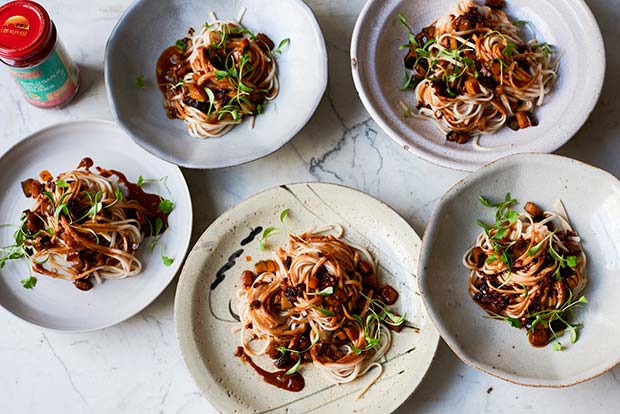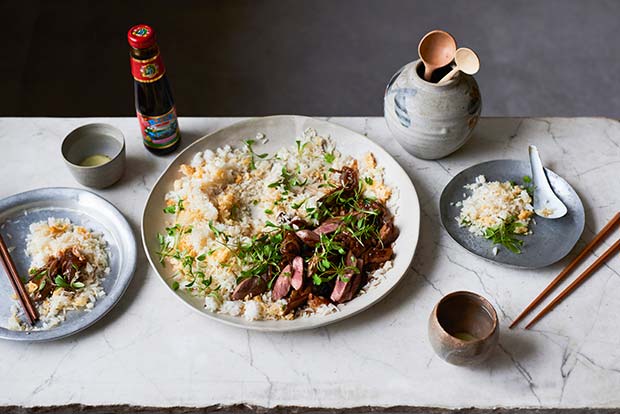As our demand for quality world foods grows in foodservice and the on trade and consumers’ palates become more discerning, it’s increasingly important for wholesalers to work with suppliers who can deliver authentic tastes and flavours across the UK.
 Lee Kum Kee is one of the world’s biggest Chinese sauces suppliers. Maria Chong, Managing Director of Lee Kum Kee Europe, speaks to Wholesale Manager.
Lee Kum Kee is one of the world’s biggest Chinese sauces suppliers. Maria Chong, Managing Director of Lee Kum Kee Europe, speaks to Wholesale Manager.
As Maria explains at the start of our conversation, she leads the European team and oversees the London-based business operation, developing strategies and plans to drive growth of Lee Kum Kee in Europe, but there’s more to it than that:
“My role also involves leading and coaching an effective team across the various functions, so together we can deliver our annual and long-term business objectives and targets. It’s important that I’m continually liaising with our local teams, looking at how we can drive brand success and enhance the organisational structure.”
As part of the job, she is in touch with UK wholesalers at senior level: “I join the meetings with our key distributors, though not as frequently as our field sales teams, who do a great job. Sometimes I join customer meetings with the team too.”
Lee Kum Kee’s work with importer distributors across key European countries goes beyond supplying product, it’s more of a marketing partnership, says Maria: “Our involvement includes product strategy recommendations, product training, providing menu solutions and business propositions and trade marketing activity support, to help create demand for the brand that will ultimately benefit all parties in the supply chain.”
The UK has always been an important market for Lee Kum Kee, says Maria Chong, with a high number of Chinese restaurants and takeaways, population, Chinese immigrants, and students living in the country. In addition,” she says, “there’s an increasing demand for authentic, high quality Oriental sauces as the UK grows in discerning taste. As we all know, London is such a vibrant and metropolitan city leading the restaurants scene in Europe. Lee Kum Kee is the brand of choice in Chinese cooking by many British, European and Asian chefs, including those in Michelin star restaurants in the UK and around the world. High quality Chinese ingredients are definitely much sought after in fast developing restaurant hubs like London.”
The products Lee Kum Kee sell in Europe and the UK are made in specialist production sites in Hong Kong, USA, Malaysia, and China: “We own our own oyster farms and control the high quality of our ingredients and ensure there’s careful attention to detail at each and every stage of production.”
On the subject of quality, Maria is emphatic about it being definitely possible to make authentic Chinese food outside China:
“It’s not really to do with geography, more about the ingredients and culinary techniques, and flavours that deliver authenticity. Take our Oyster Sauce as an example, we use over a hundred years of expertise and craftsmanship in producing this and the sensory profile was considered the standard for oyster sauce. It’s one of the key ingredients top chefs use for authentic taste, among others.
“Having said that, creative chefs can also work with this product to create new magic of course, for a dish with a twist. But the core flavours that stay centre stage will not go wrong, and it does not limit menu innovation either.
 Even Chinese menus are evolving! I remember that a lecturer in one of the Chinese chef training institutes in Hong Kong told me that decades ago, use of fruit in Chinese cooking started to kick in and in those days it was considered fusion. And, if you go to dim sum restaurants in Hong Kong, you might have noticed some dim sums are using Worcestershire sauce for dipping, such as Steamed Beef Balls and Spring Rolls. It has been built into the menu over years. I am sure when it first started, it was a new try. I believe Chinese cuisines, like any other cuisines around the world, will continue to evolve.”
Even Chinese menus are evolving! I remember that a lecturer in one of the Chinese chef training institutes in Hong Kong told me that decades ago, use of fruit in Chinese cooking started to kick in and in those days it was considered fusion. And, if you go to dim sum restaurants in Hong Kong, you might have noticed some dim sums are using Worcestershire sauce for dipping, such as Steamed Beef Balls and Spring Rolls. It has been built into the menu over years. I am sure when it first started, it was a new try. I believe Chinese cuisines, like any other cuisines around the world, will continue to evolve.”
As an international food business exporting to the UK, Maria and her colleagues are optimistic about life after Brexit: “Brexit is still a work in progress and the landscape in regard to import duties, exchange rate and legislation is unknown. But it’s not all doom and gloom, some business leaders still sense opportunity for well-executed propositions in the foodservice sector.
They believe there is a re-balancing of the market and that those with a strong, clear proposition will thrive. People will still want to eat out and there is always a need for operators with fresh, well-run concepts.”
Lee Kum Kee recently published a UK foodservice report looking at the trends in Oriental cuisine. The key trends are focused around three areas, says Maria – menu development, ingredients and marketing:
“In terms of menu development, we should be embracing trends from around the world – there’s plenty of ‘new’ and exciting ingredients consumers are willing to try. Although, whilst consumers are keen to explore new flavours and ingredients they need a little explaining or to be given inspiration. Secondly, special diets are important with 70% of British consumers having either dietary or wellbeing led considerations when eating out. Moreover, Oriental food fits well with the drive for healthy fresh food, as meals are always based around a balance of fresh vegetables, protein and carbohydrate. Lastly, whilst consumers are keen to explore new flavours and ingredients they need a little explaining or to be given inspiration. Working closely with ingredient suppliers who have a wealth of knowledge will help operators.
“Our report addresses the fact that health and wellbeing is a key trend driving consumer dining habits. However, this trend isn’t limited to just special diets such as vegetarian, vegan or pescatarian, the report comments on the general shift in diners looking for fresh and unprocessed dishes; 38% of British consumers are looking for these when dining out. The report demonstrates the opportunities and challenges for foodservice operatives. One of the key opportunities is the rise in ‘kind eating’, particularly for Oriental food. Operators should be showing consumers just how healthy and nutritious Chinese food can be.
“For ingredients, there’s a drive in interest around sustainability and provenance; for example 54% of consumers claim sustainability of ingredients is important to them whilst 50% of business leaders predict food waste and sustainability will be a key trend moving forwards. Safety allergens are also key, operators need stable ingredients and consistent quality that they can rely on. The idea of authenticity is also referenced in the report with 2 in 5 consumers claiming authenticity is extremely important when eating out; operators must understand how they are being perceived and encompass relevant authenticity within their offer.
 “In terms of marketing, social media continues to help foodservice businesses to market cost-effectively. We also looked at menu design; descriptions can be used to excite and appeal, but operators should be sensitive enough not to scare or confuse the consumers. Images are a vital way to encourage consumers to try new dishes. Operators should look to encompass both new and exciting dishes as well as familiarity to encourage more visits.
“In terms of marketing, social media continues to help foodservice businesses to market cost-effectively. We also looked at menu design; descriptions can be used to excite and appeal, but operators should be sensitive enough not to scare or confuse the consumers. Images are a vital way to encourage consumers to try new dishes. Operators should look to encompass both new and exciting dishes as well as familiarity to encourage more visits.
Geographically, the trends are different too; there is a clear regional divide between consumers in London and GB. London consumers are twice as likely to say sushi, Korean BBQ and pho are their favourite dishes when eating out but be mindful that some cuisines and dishes popular in London may not be as successful elsewhere and vice versa.
Everyone is familiar with Oriental cuisine, says Maria, but it’s changed dramatically over the years, as has the UK food scene in general:
“This was one of the key reasons behind us creating this report; to understand the current status of Oriental food in the UK foodservice market and offer an effective tool for operators. It’s about unlocking the profit-making opportunity that a good Oriental food offer can present and driving business success, not just within traditional Oriental restaurants but across all foodservice sectors. The key changes for me lie in this drive in health/wellbeing, sustainability and authenticity. These factors have allowed for increasing variety and innovation when it comes to Oriental food today.
Together with more exposure of consumers through social media and travelling, we can see more types of Oriental and Chinese restaurants in the UK, which has created more excitement and choice for consumers.”
Maria sees ‘food to go’ as a further opportunity: “I believe all forms and styles of food consumption benefit our business. There’s always a place for quality ingredients. For consumers, “food to go” is expected to come with new varieties and menu revamps from time to time. The Oriental and Chinese flavours on offer in food to go are still limited, which means there is much opportunity for growth.
“Our focus is on creating authentic, high quality sauces for use across foodservice and at home. The idea of convenience is important, though. For the retail channel, we recently launched all-in-one stir-fry sauce sachets, allowing consumers to create quick signature dishes in minutes with no hassle or waste but with all the authentic flavours they desire. For foodservice, our sauces offer an authentic and convenient solution. For example, Oyster Sauce requires large quantities of fresh oysters and takes a long time to prepare, it’s just not that practical to make from scratch. Lee Kum Kee offer quality short cuts which enable authenticity, but that fits in with the demands of running a busy kitchen.”
Soy and other Oriental sauces famously have high salt contents and we’re all supposed to be watching our salt levels, but Maria remains firm:
“Our sauces and condiments are made to use sparingly. That means when used in cooking as part of a meal, the end results will be acceptable levels of salt. Chinese eating is based on the key formula of a balance of protein, carbohydrate and vegetable, with “balance” being key. At the end of the day, having the appetite induced through great food encourages food enjoyment and nutrient intake. Salt is the most original seasoning ingredient from nature. As long as we do not overuse, I don’t see the need to worry as sauces are used in small amount. Having said that, we do have salt reduced soy sauce but they are for retailers that specialise in Asian products. Consumers and chefs in general do not ask for this because sauces and seasoning are used in small amounts.”
The summer BBQ season is a peak time of year for Lee Kum Kee, says Maria, and their next big above the line consumer campaign is coming up: “The Lee Kum Kee range lends itself really nicely to the summer season; the sauces are versatile, perfect for marinating or a summer salad dressing. We’re also putting plans in motion for Chinese New Year 2020 – we’ve had some really successful campaigns, most recently working with Ken Hom and Gizzi Erskine. Watch this space!”
Lee Kum Kee have a strong NPD programme, taking on consumer insights, trends and changing food and purchasing habits. In 2019, gluten-free Hoisin Sauce, Teriyaki Sauce and chilli sauce, along with the like of Mushroom vegetarian stir-fry sauce, seasoned vinegar, and Sriracha Mayo will be seen in the UK market, to make these exciting flavours accessible to a wider audience of British customers.
Going forwards Lee Kum Kee will continue to invest in understanding the motivations of consumers from both a foodservice and retail point of view, says Maria: “It’s important that we continue to listen to consumers and evolve our offering to respond to the shift in consumer buying behaviours. However, in the area we are knowledgeable with, Chinese sauces, we will put forward more food experience and solutions, and introduce new products that make life easier for our consumers without sacrificing taste and appetite.”




Comments are closed.